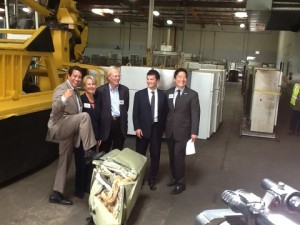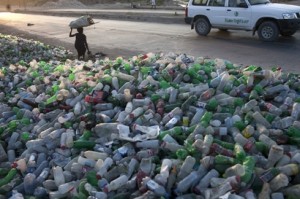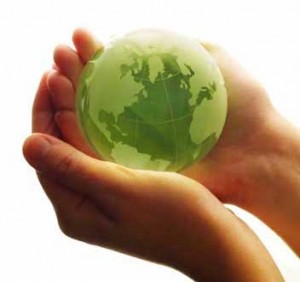EPA, Southern California Edison Mark Recycling of 1 Million Refrigerators
$1 Billion in Energy Costs, 3.9 Million Tons of Carbon Dioxide Emissions Offset So Far
 Southern California Edison (SCE), one of the founding partners of U.S. EPA’s Responsible Appliance Disposal (RAD) Program and a 2012 ENERGY STAR Sustained Excellence award winner, reached a national conservation milestone by crushing its 1 millionth refrigerator. SCE is the first utility to achieve the 1 million mark. The event was held yesterday at an Appliance Recycling Centers of America facility that recycles household refrigerators and freezers, using best available environmental practices.
Southern California Edison (SCE), one of the founding partners of U.S. EPA’s Responsible Appliance Disposal (RAD) Program and a 2012 ENERGY STAR Sustained Excellence award winner, reached a national conservation milestone by crushing its 1 millionth refrigerator. SCE is the first utility to achieve the 1 million mark. The event was held yesterday at an Appliance Recycling Centers of America facility that recycles household refrigerators and freezers, using best available environmental practices.
As one of EPA’s 47 RAD partners, SCE’s recycling efforts have avoided emissions of more than 177,000 pounds of substances that harm the ozone layer, and about 3.9 million metric tons of carbon dioxide, the equivalent of removing 760,000 cars from the road.
“We congratulate SoCal Edison and its customers for their efforts to protect our atmosphere and conserve energy,” said Jared Blumenfeld, EPA’s regional administrator for the Pacific Southwest. “The recycling of a million appliances makes a difference to the environment by safely disposing ozone-destroying refrigerants, mercury and toxic PCBs.”
Since 1994, SCE customers have recycled a million appliances, preserving 7.9 billion kilowatt-hours of electricity — or $1 billion in energy savings for SCE customers. Emissions avoided by taking those inefficient refrigerators and freezers off the grid equal: Full Article:EPA, Southern California
Cruise Industry Continues to Build on Successful Track Record as Environmental Stewards of the Seas They Sail
 Cruise Lines International Association Commemorates Earth DayIn honor of Earth Day, Cruise Lines International Association (CLIA) is proud to highlight the recent and ongoing efforts of its member cruise lines to protect and preserve the environment in which they operate.
Cruise Lines International Association Commemorates Earth DayIn honor of Earth Day, Cruise Lines International Association (CLIA) is proud to highlight the recent and ongoing efforts of its member cruise lines to protect and preserve the environment in which they operate.
“We believe it is our responsibility to protect the environment in which we operate, and we take great pride in the strides our industry has made to chart a sustainable course for future generations.”
“In the 37 years since CLIA was established, our industry has made significant progress in reducing our environmental impact by implementing responsible practices and investing hundreds of millions of dollars in new technologies that are having a tremendous impact today,” said CLIA President and CEO Christine Duffy. “We believe it is our responsibility to protect the environment in which we operate, and we take great pride in the strides our industry has made to chart a sustainable course for future generations.”
CLIA members have been at the forefront of wastewater treatment, emissions reduction and developing innovative technologies to further reduce the environmental impact of cruising. As more fuel efficient ships have come into service, CLIA members have been systematically reducing air emissions, including sulfur oxides, nitrogen oxides, carbon dioxide and particulate matter. In the near future, international regulations will further reduce sulfur limits, helping to reduce air emissions across all oceans. To meet these standards, the industry has been investing in new technologies that manage the use of energy more effectively, such as testing the first ever cruise ship engine exhaust gas scrubbers and developing engines that run more efficiently.
“Our industry has a vested interest in protecting the environment, not only because it is the socially responsible thing to do – but because the very nature of our product depends on a healthy natural environment — clean oceans and beaches are essential to the cruise experience. CLIA has made great strides to become a leader in the maritime industry with responsible practices and innovations that are reducing environmental impact,” Duffy said. Read the full article: Cruise Industry Continues to Build on Successful Track Record as Environmental Stewards of the Seas They Sail
Mike Biddle: We can recycle plastic
Governor Brown Inaugurates Major Bottle-to-Bottle Recycling Plant
 On March 2, 2012, Governor Edmund G. Brown Jr. inaugurated carbonLITE’s 220,000 square foot plant in Riverside, California, the largest bottle-to-bottle recycling plant in the world. The plant will recycle more than two billion plastic bottles a year.
On March 2, 2012, Governor Edmund G. Brown Jr. inaugurated carbonLITE’s 220,000 square foot plant in Riverside, California, the largest bottle-to-bottle recycling plant in the world. The plant will recycle more than two billion plastic bottles a year.
“Companies like carbonLITE are revolutionizing the recycling industry and dramatically reducing the huge amount of plastic dumped in California landfills every year,” said Governor Brown.
Governor Brown was joined at the ribbon-cutting ceremony by executives from PepsiCo and Nestlé Waters, along with representatives from the U.S. Environmental Protection Agency, Riverside County and the City of Riverside.
“We’re committed to being the leading bottle-to-bottle recycler, preserving resources and reducing the carbon footprint from PET bottle production,” said Leon Farahnik, carbonLITE’s chairman. “We’re honored to have the support of Governor Brown and U.S. EPA Regional Administrator Jared Blumenfeld, among the many others who came out to our grand opening and experienced our state-of-the-art recycling facility.”
In October 2011, the Governor signed Assembly Bill 1149, which provided subsidies, known as “market development payments,” to manufacturers who use recycled plastic and to processors—such as carbonLITE—who fabricate it.
Today, most plastic bottles collected in California are exported to China, where they are used to make polyester for clothes and other commodities. carbonLITE takes Californians’ used plastic bottles and turns them back into bottles here in California, using a pellet technology that preserves natural resources and reduces landfill waste.
Eco-Friendly Meets Economy:thredUP Survey Shows Holiday Shoppers Buy Early, Look for Savings Online and Through Secondhand Retailers
 thredUP Announces Eco-Monday in Response to Retail Shopping Habits of the Budget and Eco-Conscious Consumer
thredUP Announces Eco-Monday in Response to Retail Shopping Habits of the Budget and Eco-Conscious Consumer
The holidays are full of traditions – including, for many Americans, the tradition of overspending, buying too many gifts (and the packaging, wrapping paper and cards that go with them) – often resulting in starting the New Year saddled with debt. In these trying times, however, a growing number of consumers favor buying secondhand over shopping retail, proving that the “eco” in “eco-friendly” now applies to economics as well.
thredUP.com, the leading mom-to-mom marketplace for secondhand children’s clothes, books and toys, recently surveyed their members and found that 56% of respondents are on the lookout for secondhand gifts year-round, from sites like thredUP and other sources, with over 50% looking for used items before hitting the retail stores for new.
These findings led thredUP to challenge all consumers to think about their shopping habits and embrace the peer-to-peer model. They have dubbed the Monday before Thanksgiving “Eco-Monday,” and are asking people to consider buying used before buying new this holiday season. In doing so, thredUP hopes to reduce the amount of waste (by some estimates, an additional 1 million tons of trash) that Americans generate during the holiday season, as well as save consumers up to hundreds of dollars off of buying retail.
A whopping 95% of survey respondents said that their holiday shopping budget is less than or equal to their budget last year, so bridging the gap between eco-friendly and economical is key, according to thredUP CEO James Reinhart. “We offer moms a way to get rid of toys, books and clothes that their kids have outgrown and the opportunity to put a smile on another kid’s face this holiday season.”
thredUP members agree: one mom said, “I’m really excited that I found thredUP because it has been a very tight budget this year and I was starting to think we would not have a Christmas at all, but thredUP has saved the day! By sending out boxes of outgrown toys and clothes I can save up credits to pay for gifts for my children.”
Eco-Monday is November 21, 2011, and will kick off thredUP’s annual Holiday Toy Swap, where members are encouraged to post boxes of their old toys to make room for new ones. The Toy Swap runs through December 16 on www.thredup.com.
Quest CEO Addresses Corporate Recycling Conference
Exec Delivers Keynote on “10 Steps” for Reducing Waste
 Brian Dick, CEO of Quest Recycling Services, LLC, was a keynote speaker at the Corporate Recycling and Waste Conference (CRWC), held in Orlando, Florida on September 29, 2011.Mr. Dick introduced Quest’s “10 Steps” process, which leads client companies to reduce waste creation and dramatically diminish ecological footprints and operating costs.
Brian Dick, CEO of Quest Recycling Services, LLC, was a keynote speaker at the Corporate Recycling and Waste Conference (CRWC), held in Orlando, Florida on September 29, 2011.Mr. Dick introduced Quest’s “10 Steps” process, which leads client companies to reduce waste creation and dramatically diminish ecological footprints and operating costs.
Reflecting on the CRWC event, Mr. Dick observed, “Waste and Recycling News along with Republic Services did a great job. They put together a conference that allowed companies large and small to understand how they can reduce the amount of waste they generate and implement meaningful recycling programs.” He added, “The conversations were enlightening, the business cases were targeted, and the key objectives were directly applicable.
“Quest Recycling is at the forefront of waste minimization, food waste recycling, and waste-to-energy movements. Working with clients in all 50 states and Canada, Quest is directly responsible for the diversion of over 1 billion pounds of waste from landfill in 2010.
“Waste minimization is a rapidly evolving industry,” said Mr. Dick during his presentation. “Between changes in regulations, emergence of new technologies and expansion of recycling outlets, what was cost-prohibitive 12 months ago is now cost-neutral. Many companies who considered a food waste recycling program in the past had sticker shock, and could not justify the expense. Today, the costs are significantly more manageable. Quest can help you develop and roll out a program that will effectively reduce operating cost and maximize profits.”
About Quest Recycling Services: Quest is one of the nation’s fastest growing full-service recycling companies. Headquartered in Frisco, Texas, Quest manages the recycling effort of over 7,500 client locations throughout the US and Canada. Quest customers span from automotive to industrial, fleet, municipalities, hospitality and food service industries. Quest also partners with Earth911 to inform consumers about recycling and local community resources. Learn more at www.QuestRecycling.com.
Green Planet 21 Chosen as P&G Sole Recycler for Utah Paper Mill
Oakland-based company picked to service P&G’s first paper mill in North America
 The 21 tons of paper mill sludge that tipped today
at 5185 Harold Gatty Drive represent the first of many such shipments designed to
help Procter & Gamble reach a sustainability goal of zero landfill. It also reflects
the technological capabilities of Green Planet 21, a leading longtime private
recycler servicing all of North America.
The 21 tons of paper mill sludge that tipped today
at 5185 Harold Gatty Drive represent the first of many such shipments designed to
help Procter & Gamble reach a sustainability goal of zero landfill. It also reflects
the technological capabilities of Green Planet 21, a leading longtime private
recycler servicing all of North America.
“They’ve chosen us to take them to zero landfill,” Green Planet 21 Owner and Founder Steve Sutta says. “With the exception of a site in Los Angeles, we also are in the middle of taking every North America manufacturing facility for Gatorade® to zero landfill; we took Frito Lay to zero landfill with its Fritos® products, and now we’ll do the same for P&G with its Charmin® and Bounty® brands.”
Operating on the triple bottom line principle of people – planet – profits, Green Planet 21 and its affiliated businesses have a history of providing quality, comprehensive waste management services. In Salt Lake City, the combined resources of American Shredding, Inc., and The Sutta Company on Harold Gatty Drive provide a one-stop resource for industrial and commercial recycling needs.
Today the businesses announced that Green Planet 21 had been selected as the sole waste recycler for the first Procter & Gamble paper mill in North America since the 1970s. Paper mill sludge will be processed at the Harold Gatty Drive facilities for reuse in other wood- and paper-based products. “When we say zero landfill, we mean zero landfill,” Sutta explains. “This means more than 99 percent of the waste from the raw materials used by P&G will be diverted from landfill into something useful.”
Executives Without Borders Launches Recycling Program to Create Thousands of Haitian Jobs
Innovative program to spur economic growth through sustainable business providing Haitian participants with higher incomes
 PORT-AU-PRINCE, Haiti – Executives Without Borders (ExecWB), in partnership with CSS International Holdings, Inc. and Haiti Recycling, will officially launch Ramase Lajan, a “cash for recyclables” program July 23 – 24 at Wahoo Bay Beach Resort just outside Port-au-Prince, Haiti. The event invites Haitian business leaders, NGOs and donors to learn about the plastic recycling program designed to spur sustainable jobs with significant incomes and remove the plastic from Haiti’s otherwise beautiful landscape and beaches improving health conditions.
PORT-AU-PRINCE, Haiti – Executives Without Borders (ExecWB), in partnership with CSS International Holdings, Inc. and Haiti Recycling, will officially launch Ramase Lajan, a “cash for recyclables” program July 23 – 24 at Wahoo Bay Beach Resort just outside Port-au-Prince, Haiti. The event invites Haitian business leaders, NGOs and donors to learn about the plastic recycling program designed to spur sustainable jobs with significant incomes and remove the plastic from Haiti’s otherwise beautiful landscape and beaches improving health conditions.
“We designed this program to be a sustainable and realistic solution for increasing employment and improving public health in Haiti”
A commercial recycling program did not exist in Haiti prior to Ramase Lajan contributing to the unprecedented amount of plastic that fill the streets and clog the canals of Haiti. This considerably reduces sanitary conditions for citizens as bacteria infected water overflows from heavy rains and spreads into communities. Ramase Lajan, which means “Picking Up Money,” will expand the collection and harvesting of plastic to create permanent jobs with substantial incomes through a network of independently owned and operated neighborhood collection centers. Each collection center will create an estimated 100 or more new jobs. This initiative will ultimately drive investment in Haiti to build factories that turn recycled plastics into products for domestic use and export.
Each collection center is designed as a self-contained storefront ideal for entrepreneurs. For a one-time cost of $18,000.00, an expense paid by sponsors, franchisees are provided with everything needed to establish a permanent business including: a manually operated compactor, collection sacks, uniforms, safety gear, and signage, as well as extensive operational and business training. These self-contained storefronts require no electricity, are built to last and are easily transportable.
“We designed this program to be a sustainable and realistic solution for increasing employment and improving public health in Haiti,” said Jason Burger, director of CSS International Holdings, Inc. and CSS Haiti S.A. “Because Haiti is a populous country with little to no job opportunities, we wanted the program to create the kinds of jobs that allows individuals to become entrepreneurs in a self-directed business that is flexible in location and time. Participants in the Ramase Lajan program will easily earn a middle class income.”
Sponsors, such as Samaritan’s Purse, have already shown their support through capital investments that have helped to build collection centers and promote livelihoods through job creation. Organizers will educate over 1,000 prominent government, business and nonprofit leaders of the benefits of the Ramase Lajan program at this weekend’s launch event. For more information regarding Ramase Lajan, its impact and how you can get involved, visit www.haitirecycli
Kyocera Honored as “Recycler of the Year” by City of San Diego, Continues Reign as City’s Most-Awarded Company for Environmental Programs
Highest Environmental Award Marks Kyocera’s Eleventh Consecutive Accolade with 18 Awards Total
 SAN DIEGO: Kyocera Communications Inc. (KCI), San Diego-based provider of Kyocera- and Sanyo-branded wireless phones in the Americas, has been named “2011 Recycler of the Year” by the City of San Diego’s Environmental Services Department (ESD). It is the eleventh consecutive year that KCI, which was formed in 2000, has been awarded by the City for its recycling and environmental practices. Kyocera, which operates multiple divisions in San Diego, now has earned 18 such awards from the City – more than any other business in San Diego, according to the ESD.
SAN DIEGO: Kyocera Communications Inc. (KCI), San Diego-based provider of Kyocera- and Sanyo-branded wireless phones in the Americas, has been named “2011 Recycler of the Year” by the City of San Diego’s Environmental Services Department (ESD). It is the eleventh consecutive year that KCI, which was formed in 2000, has been awarded by the City for its recycling and environmental practices. Kyocera, which operates multiple divisions in San Diego, now has earned 18 such awards from the City – more than any other business in San Diego, according to the ESD.
“Social responsibility and concern for the environment have been key components of Kyocera’s management philosophy since the company was founded 52 years ago”
“We continue to commend Kyocera for its focus on environmental stewardship and support of employees’ efforts to develop programs that benefit our city’s future generations,” said San Diego Mayor Jerry Sanders. “Kyocera’s efforts are protecting our city’s resources and reducing the waste that ends up in our landfills, helping to keep San Diego as ‘America’s Finest City.’”
In line with Kyocera’s philosophical commitment to environmental protection and “harmonious coexistence,” the local operations have demonstrated that taking steps to minimize environmental impacts from business operations by recycling and reducing waste can be both good for the environment and good for business. In 2010 KCI recycled more than 43,590 pounds of paper, plastic, electronic and other waste materials otherwise destined for landfills. The company also used more than 1.4 million gallons of reclaimed water, primarily for irrigation, reducing its dependence on fresh water.
“Social responsibility and concern for the environment have been key components of Kyocera’s management philosophy since the company was founded 52 years ago,” said Yasuhiro Ohishi, president of KCI. “For Kyocera, innovation isn’t just about technology and we are constantly looking for new ways to conserve natural resources. For example, our mobile phones are sold in packaging that’s 90 percent recycled and they come with User Guides loaded right onto the phones instead of printed on paper.”
Kyocera’s wireless phone unit focuses on the following recycling efforts locally:
• Cell Phones: Collection bins are placed in KCI’s facilities, along with a link on KCI’s external Web site telling consumers where they can recycle phones at no cost and even direct any proceeds to their choice of several charitable organizations.
• Cardboard: Cardboard is collected from delivered items and is sent to a recycler. In 2010, employees recycled 10,365 pounds of cardboard.
• Paper: White and colored paper is collected in offices, copy rooms and labs, while confidential and proprietary documents are collected and securely shredded. The operation recycled 2,414 pounds of mixed paper in 2010.
• Electronic Scrap: In 2010, employees collected and recycled 5,814 pounds of miscellaneous electronic scrap from labs and offices.
More information, including the company’s ISO-14001 certification for environmental management systems, is available at www.kyocera-wireless.com. Information about Kyocera Corporation’s global environmental and social responsibility efforts is available at http://global.kyocera.com/company/csr.
More Recycling
